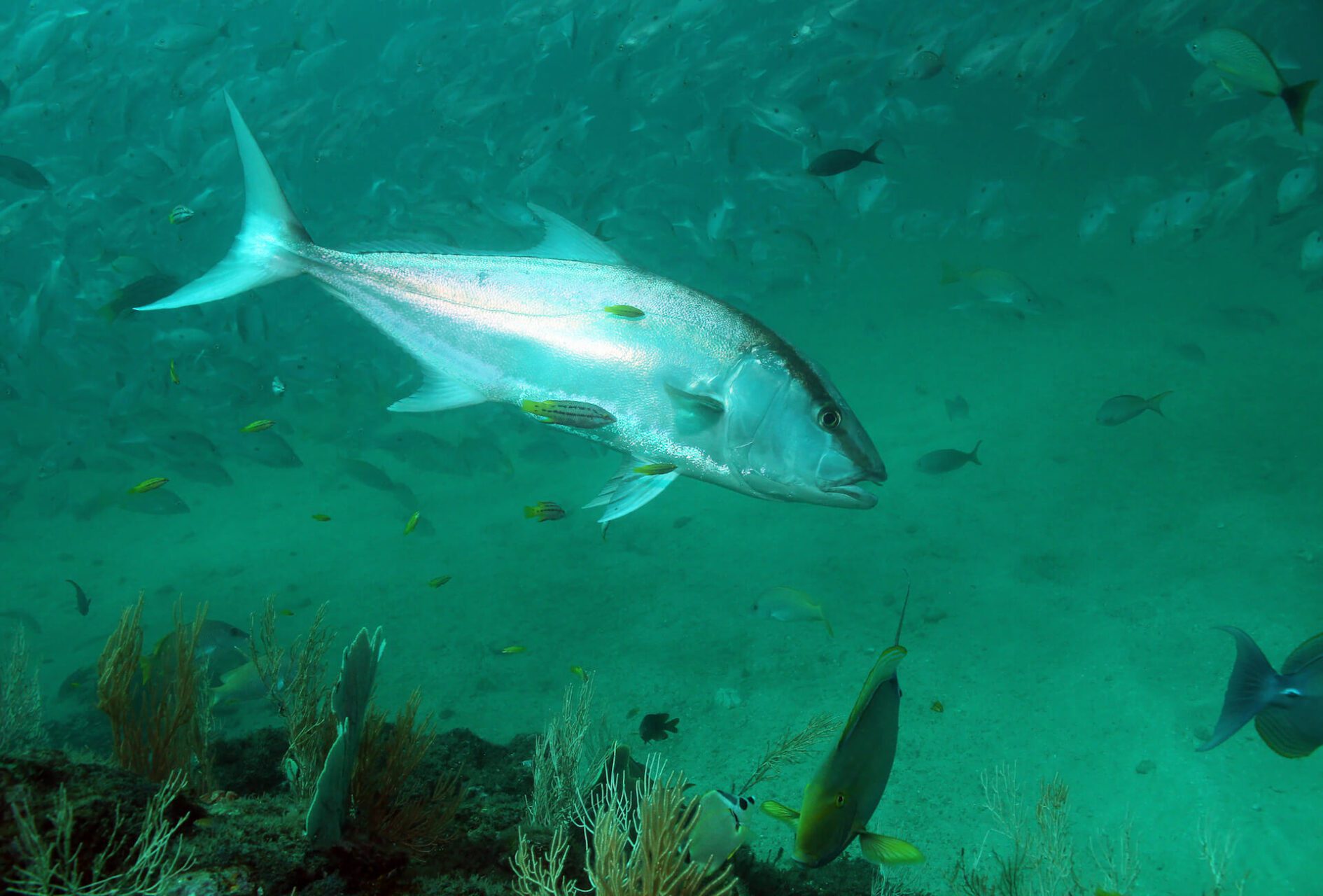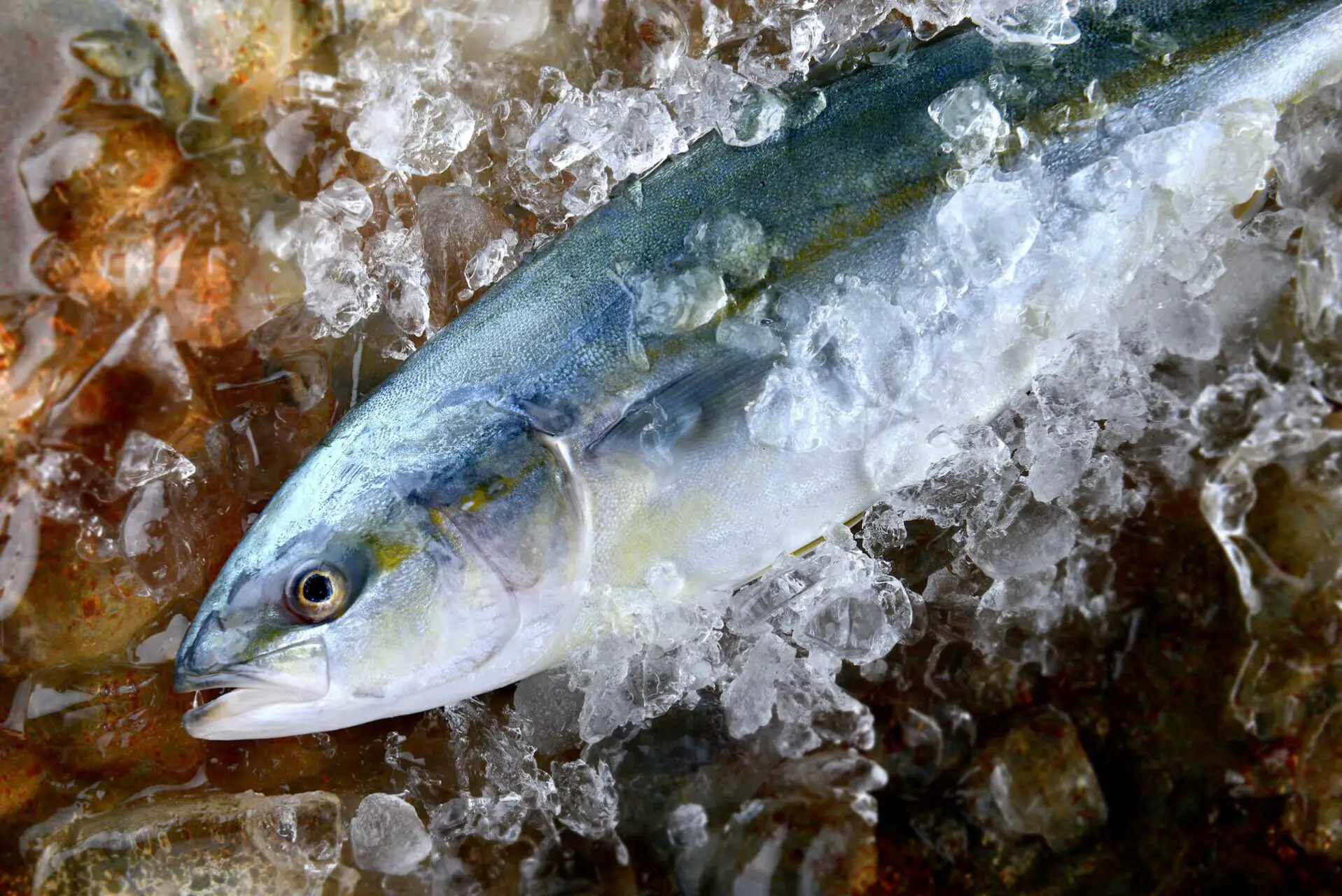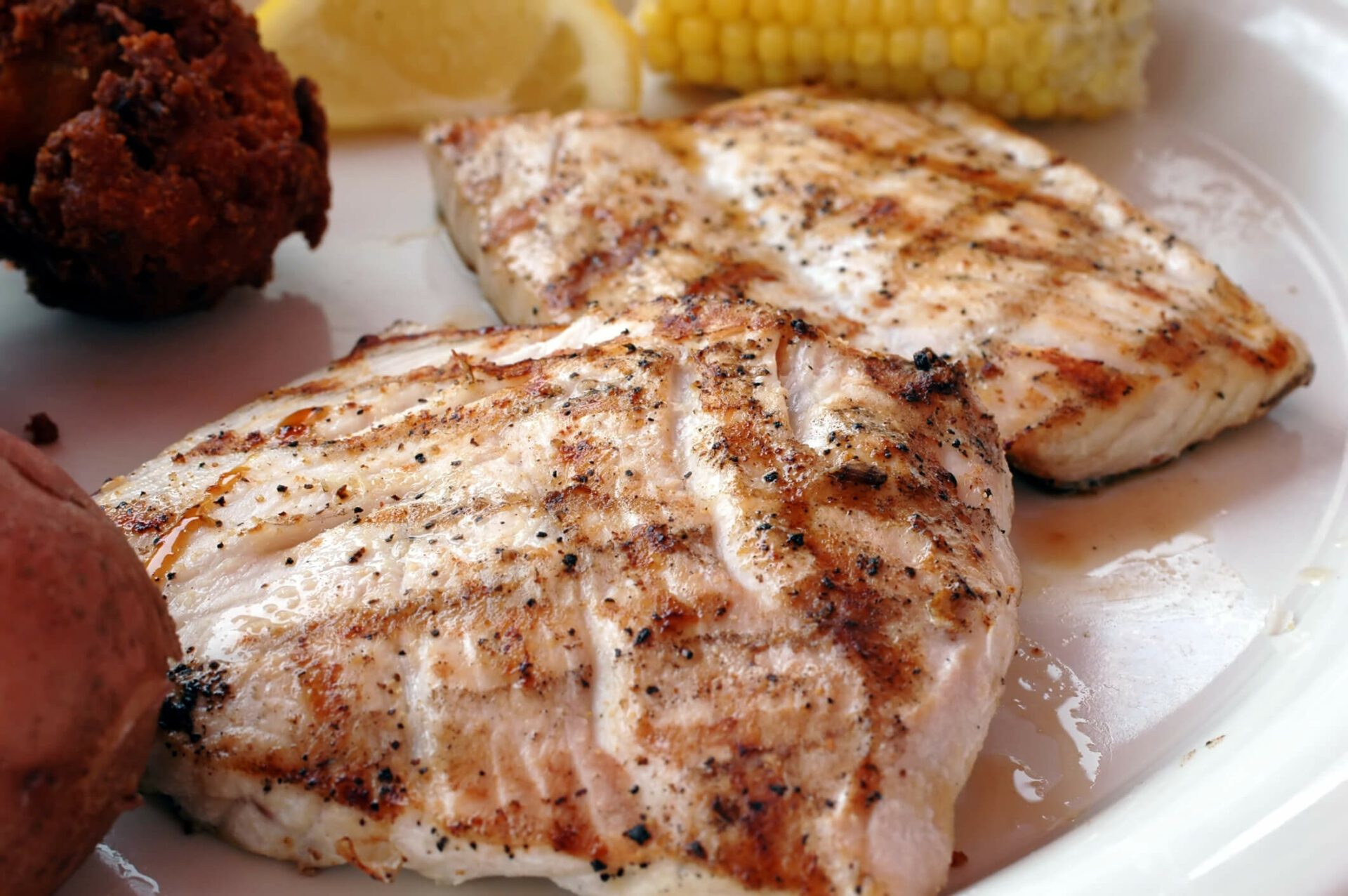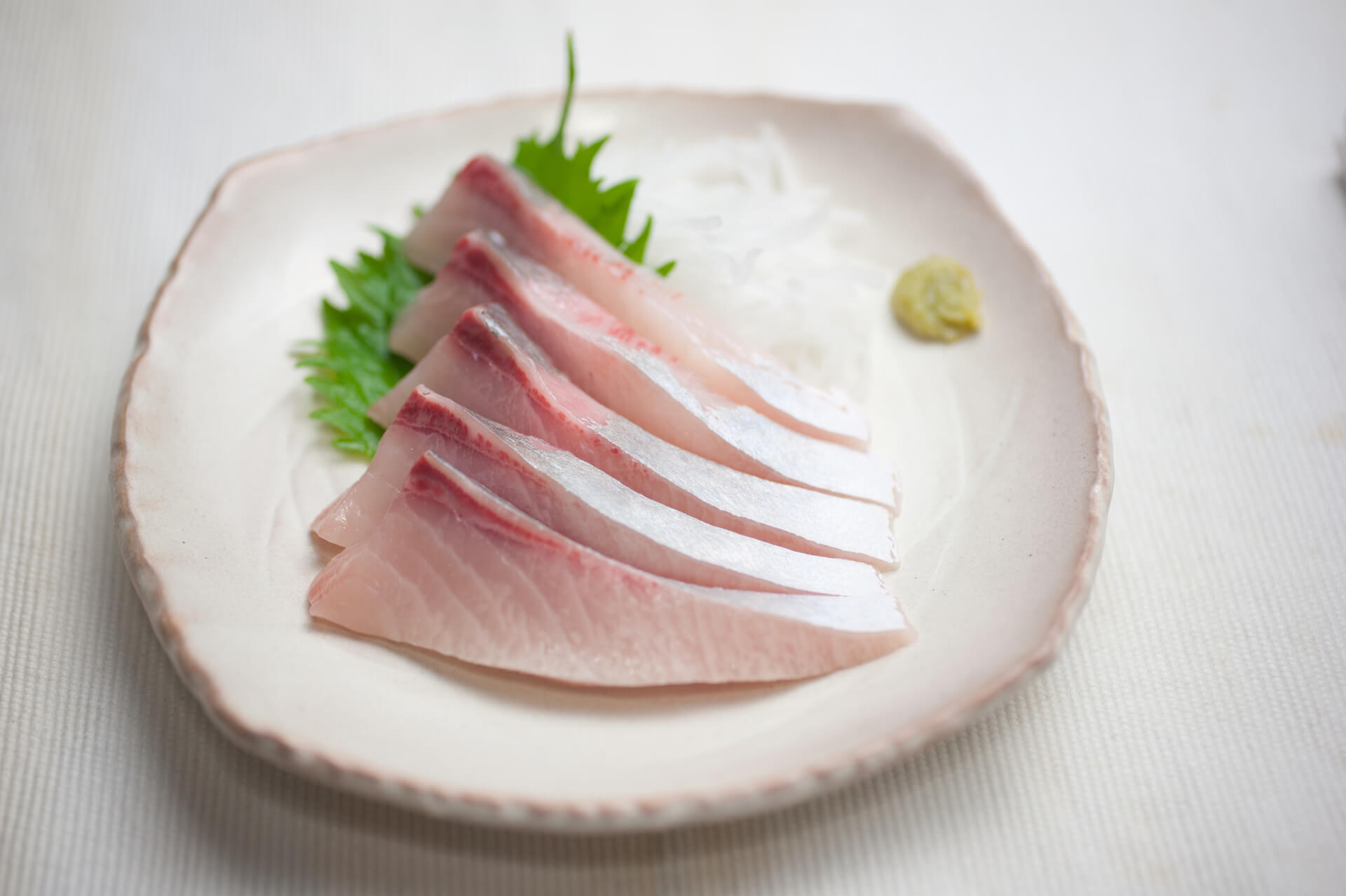Last updated on March 21st, 2023
- What Does Trout Taste Like: Unraveling the Flavor Mysteries - August 2, 2023
- Best Fishing Bibs Tested & Reviewed: Buyer’s Guide - July 19, 2023
- Fishing for Whiskers: Best Bait for Catfish - July 12, 2023
Do you have a yen for something aquatic yet unique? Have you ever heard of Amberjack and wondered if it’s safe to eat? Can you eat amberjack, or is this a fish that should be avoided at all costs? In this article, we’ll explore the world of Amberjack and answer your questions about its taste, safety for consumption, where they live in the wild – plus some delicious recipes. So come join us as we dive into whether or not can you eat this fish.


Table of Contents:
- Where Do Amberjack Live?
- What Does Amberjack Taste Like?
- Can You Eat Amberjack Raw?
- Recipes for Amberjack Dishes
- Conclusion
- FAQs
Where Do Amberjack Live?
Amberjack is a species of jackfish found in the Atlantic, Pacific, and Indian Oceans. Amberjack inhabit a wide area, ranging from New England to Brazil in the West Atlantic and Japan to Australia in the East Pacific, as well as parts of the Mediterranean Sea and Southeast Asia.
Geographic Range
Amberjack inhabits tropical and subtropical waters at depths ranging from 30-400 feet (9-122 m). It is commonly found along continental shelves near coral reefs, wrecks, pinnacles, drop offs, estuaries and mangrove forests. The fish prefers areas with strong currents where it can find plenty of food sources such as shrimp or squid.
Habitat Preferences
Amberjack are typically solitary creatures but they also form large schools during migration periods or when spawning occurs. Amberjack prefer a warm temperature of 75°F (24°C), but can tolerate up to 86°F (30°C).
Amberjacks migrate seasonally between different regions depending on water temperature changes or availability of prey items. During winter months, they tend to move south towards warmer climates while in summer months they move northwards for cooler waters. This behavior helps them avoid predators and take advantage of the abundant food sources available at various times throughout the year.


What Does Amberjack Taste Like?
Amberjack is a fish with a mild flavor and firm texture. Its flesh has an off-white color that turns to pinkish when cooked. Amberjack has a mild, buttery flavor with subtle sweetness that appeals to those who don’t enjoy the strong flavors of other seafood. It’s not overly “fishy” in flavor, making it perfect for those who don’t enjoy the strong flavors associated with some other types of seafood.
When it comes to texture and consistency, amberjack is quite versatile. When raw or lightly cooked, the flesh of amberjack is delicate yet maintains its structure; however, if overcooked it can become flaky and dry like many other fish varieties. To get the best results from your cooking experience try grilling or pan searing over high heat for just a few minutes per side until opaque throughout but still moist inside.
For added flavor try marinating your amberjack in olive oil and herbs such as oregano or thyme before cooking – this helps to keep the fish juicy while adding extra layers of flavor. You can also stuff your fillets with diced vegetables like bell peppers or onions for an even more flavorful dish. For something truly special try baking them in parchment paper along with white wine, lemon juice, garlic cloves, capers and fresh herbs – you won’t regret it.
When preparing Amberjack at home there are several things to keep in mind: make sure you always use fresh ingredients (especially when using raw fish), cook on high heat quickly so that the flesh doesn’t dry out too much (this goes especially for larger cuts) and season generously with salt and pepper after cooking; this will really bring out all the delicious flavors.


Key Takeaway: Amberjack is a mild, buttery fish with a firm texture that can be grilled or pan-seared over high heat for just minutes per side to keep it juicy. Marinate in olive oil and herbs before cooking for added flavor, stuff fillets with diced vegetables, or bake them in parchment paper along with white wine and fresh herbs – all surefire ways of making this seafood delicacy truly special.
Can You Eat Amberjack Raw?
Eating raw amberjack can be a delicious, healthy treat – but it comes with some safety considerations. Amberjack is an oily fish that contains high levels of mercury, so it’s important to check the source before consuming. To ensure you’re getting the freshest possible product, opt for wild-caught amberjack whenever possible and avoid farm-raised varieties. Additionally, make sure to properly clean and prepare your fish before eating it raw.
When preparing your amberjack for consumption, take extra care to remove any scales or bones that may still remain on the fillet. Scales can contain bacteria which could lead to food poisoning if ingested; similarly, small bones can easily become lodged in the throat if not removed beforehand. Once all traces of scales and bones have been removed from your fillet, rinse it thoroughly under cold running water and pat dry with paper towels before slicing into sashimi pieces or marinating for further preparation.
Amberjack can be a nutritious snack when enjoyed in its raw form; it is packed with omega-3s that promote heart health, protein for muscle growth, and vitamins B12 and D to support overall wellbeing. Therefore, when consuming raw fish like amberjack, it is essential to exercise caution and follow proper food safety protocols.
Eating raw amberjack can be a safe and healthy option, however it is important to ensure that the fish has been properly prepared. With these recipes for Amberjack dishes, you will be able to experience all of the delicious flavors that this type of fish has to offer.


Recipes for Amberjack Dishes
Grilled Amberjack with Herbs and Lemon Juice is a great way to enjoy the unique flavor of amberjack. Start by marinating the fish in a mixture of olive oil, lemon juice, garlic, oregano, thyme and salt for at least an hour before grilling. Once it’s time to fire up the grill, use medium-high heat for optimum charring and avoiding over cooking. For a final touch, garnish the grilled fish with some freshly chopped herbs such as parsley or cilantro.
Amberjack Sashimi with Soy Sauce and Wasabi is another delicious way to prepare this fish. First start by slicing up your amberjack into thin slices about 1/4 inch thick using a sharp knife or sashimi slicer. Slice the amberjack into thin pieces and season with soy sauce, wasabi paste, and garnish with ginger slices or green onions. Finally garnish the dish with some fresh ginger slices or green onions for added color and texture contrast as well as additional flavor complexity.
Baked Amberjack with Garlic Butter Sauce is yet another great way to enjoy this tasty fish. Combine melted butter with garlic cloves, oregano/thyme (or both), salt & pepper and lemon zest if desired to create a flavorful butter sauce for the baked amberjack. Next place the prepared filets into an oven safe baking dish before pouring over the butter mixture evenly across all pieces making sure they are fully covered in sauce before popping them into the preheated oven for about 20 minutes until cooked through completely but still juicy inside. Serve hot alongside steamed vegetables like broccoli or carrots topped off again more fresh herbs such as parsley or chives.
Key Takeaway: Amberjack can be prepared in an array of scrumptious dishes, from barbecuing with aromatic herbs and citrus to serving as sashimi topped with soy sauce and wasabi or baking smothered in garlic butter. With its unique flavor profile, amberjack dishes are sure to tantalize your taste buds.
Conclusion on Can You Eat Amberjack Fish?
In conclusion, Amberjack is a tasty and versatile fish that can be enjoyed in many ways. No matter how you want to enjoy it, there are lots of recipes out there that can help make your meal with Amberjack a success. The best part about eating Amberjack is knowing that this type of fish has been deemed safe for human consumption by the FDA. So if you’re ever wondering “Can I eat amberjack?”, the answer is yes.
If you’re looking for the best fishing tackle, lures, techniques and tips to help make your next bass or recreational fishing trip a success, then 4everfishing is here to provide you with reliable solutions. Let us help equip you with the necessary knowledge and resources so that your angling experience can be as enjoyable as possible!
FAQs: Are Amberjack Good to Eat?
Why do people not eat amberjack?
Amberjack is a large, predatory fish found in the Atlantic Ocean. Many find the taste and oily texture of amberjack difficult to enjoy. Furthermore, amberjack can contain high levels of mercury which makes it an unhealthy choice for consumption. Additionally, due to their size and difficulty in catching them commercially they are not widely available as food sources. As such, most people choose not to eat amberjack out of preference or health concerns.
Is amberjack a healthy fish to eat?
Yes, amberjack is a healthy fish to eat. Amberjack is a great pick for those who want to get protein without taking in too much fat, with it being high in the nutrient and low in lipids. Amberjack also contains essential vitamins and minerals such as Vitamin A, B6, C, E and K along with potassium and magnesium. Omega-3s present in amberjack may assist in lessening inflammation and improving cardiovascular wellness. All of these factors make amberjack a nutritious and delicious choice for anyone looking to add more seafood into their diet.
What does Amberjack taste like?
Amberjack is a popular game fish that is highly sought after by anglers and fishermen. It has a mild, sweet flavor with firm flesh and large flakes when cooked properly. Some may find the taste of amberjack to be too intense for their palate, however many individuals relish its distinctive flavor. Amberjack can be prepared in numerous ways including grilling, baking, or pan-searing; all of which bring out the best in this tasty fish.
Is an amberjack a tuna?
No, an amberjack is not a tuna. Amberjacks are members of the Carangidae family and belong to the genus Seriola, while tunas are part of the Thunnini tribe in the Scombridae family. The two fish have different physical characteristics; amberjacks have yellowish-brown coloration with dark stripes or spots along their sides and silvery undersides, while tunas usually display blue coloring on top that fades into silver underneath. Additionally, they differ in size and habitat preferences; amberjacks can reach up to 3 feet long whereas tunas typically grow larger than 4 feet long and prefer warmer waters than those preferred by amberjacks.
